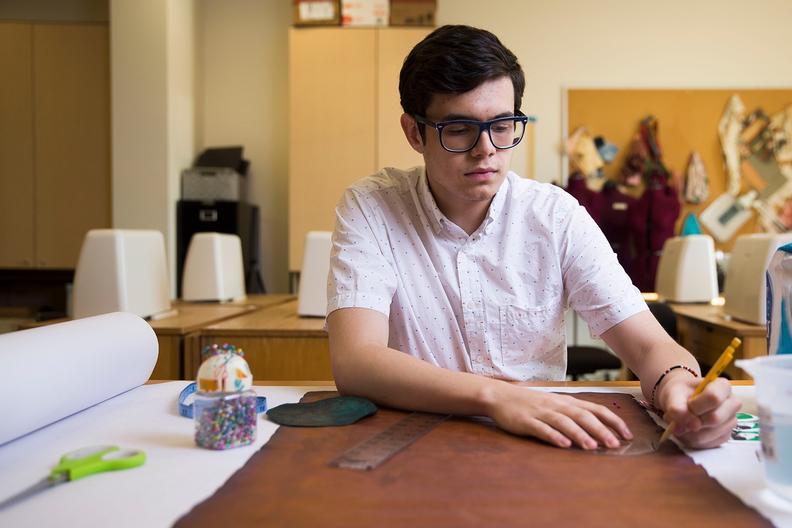This Fashion Student Is Growing His Own Clothes
Liberty University fashion student Luis Quijano has discovered a new way to create sustainable clothing: by growing his leather-like fabrics using fermented water, sugar, green tea, and kombucha.
Updated Nov. 19 2020, 9:38 p.m. ET
While most fashion students tend to concentrate on mastering draping or designing colorful collections, Liberty University student Luis Quijano has been consumed with a project of a different nature: growing his own clothes.
Through the unlikely pairing of fashion, microbiology and mechanical engineering, Quijano has produced a leather-like material composed of fermented water, sugar, green tea, and kombucha. The resulting fabric is a sustainable, durable material that can be crafted into any number of fashionable designs.
Quijano got the idea for his home-grown clothes from a TED talk by fashion designer Suzanne Lee, who also makes a material out of a kombucha-derived substance. He was excited by the abstract idea, but also realized for the first time how unsustainable the fashion industry really is.
“Before I started this, I just didn’t realize how much pollution that (manufacturing) fabric can produce and that an alternative could exist that could eliminate all of that waste,” Quijano said in a press release. “And the fact that you could grow your own clothes just sounded so abstract.”
Quijano began the process of making his material in his dorm room last November, mixing all of the ingredients together in containers he would set on his room's floor as the substance fermented. After two to three weeks, an inch-thick layer of solid material would form on top of the mixture, which, when dried, becomes the leather-like material that is able to be sewn together to make clothing.
Quijano's new material joins a burgeoning trend of of sustainable fashion, and specifically sustainable leather-alternatives. One designer is creating faux leather from pineapple leaves; another is creating fashion-forward shoes out of apple peels; and yet another is using old fire hoses to create leather-like accessories. Beyond these niche projects, large companies like Nike, Everlane, H&M and more are opting into sustainable practices in a notoriously unsustainable industry.
Since he began his experimentation with the material, Quijano has found ways to improve and alter the process to achieve the best results, as well as variations of the fabric. For instance, by merging two different layers of material together with flowers in between, he can create floral patterns. Now he's testing new variations of his process that would make his material thicker and waterproof.
Over the summer, Quijano was given a grant to study at the Queensland University of Technology in Australia, during which he experimented with alternative forms of sugar — from rice to potato starch — to find out what created the most durable, wearable product.
The project has also gotten off his dorm rom floor: In partnership with Liberty’s Department of Biology & Chemistry, Quijano now uses incubators to grow the material. And now his goal is to take it to the next level.
“My end goal with this textile is to really develop it to a commercial standard,” Quijano said. “I want to do more textile research, and while I’m doing that, continue to refine my fashion skills, so they work together. I don’t know if I’ll use this same sort of material and process in the future, but because of all this, I will try a lot harder to incorporate sustainable aspects into my designs.”
